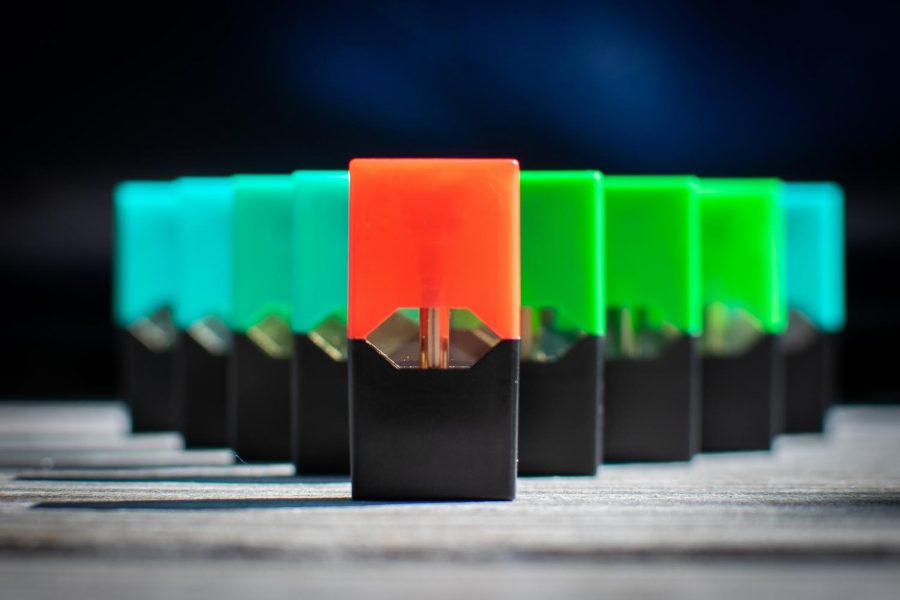Juul Regulations are Good for the Youth
It is near impossible to exist as a college student without noticing the sleek, black, USB looking vapes that have pervaded our generation. The inconspicuous devices, known as Juuls, can be seen glued to lips of freshmen and seniors alike. Mint, mango and cucumber smoke permeate dining halls, off campus bars and even class lectures.
Juul Labs, Inc. claims the product was made to “improve the lives of the world’s one billion adult smokers” and was marketed strictly as an alternative to cigarettes for adults already addicted to nicotine.
While Juul Lab’s mission and the intent of its promotion of techniques can only be speculated upon, it is clear that an increasingly younger population of users is emerging.
According to the 2018 National Youth Tobacco Survey, 20.8 percent of high school students and 4.9 percent of middle school students are current e-cigarette users. These percentages total over 3.6 million youth inhaling vaporized nicotine, the vast majority of them with Juul products.
What is especially concerning is the proportion of these adolescent users who are unaware they are consuming an addictive chemical. According to a study from Truth Initiative, 63 percent of 15-24 year old Juul users did not know the product always contains nicotine; the number of teens oblivious to the effects of nicotine on their bodies is likely even higher.
Every time a teen whips out their Juul and inhales mango-flavored smoke, they are consuming a highly concentrated dose of the stimulate. Nicotine can inhibit sleeping, decrease appetite and negatively affect brain devolvement, especially in young users. Juul usage also greatly increases one’s probability of smoking real cigarettes that contain ingredients such as tar and tobacco, which have been proven to cause cancer.
The latest development in the Juul saga occurred at the beginning of this month when the Food and Drug Administration seized documents from the company’s headquarters and arranged a public hearing for Dec. 5.
The actions of the FDA were prompted by the failure of Juul Labs Inc to submit a satisfactory proposal to restrain nicotine consumption among teens.
According to a statement from FDA Commissioner Scott Gottlieb, the government organization is planning a series of e-cigarette regulations aimed at curbing the existent usage among teens, as well as preventing future adolescents from becoming addicted to these products.
The actions announced include citations of retailers violating youth sales laws, research efforts into the popularity of Juul products and increased transparency with the Juul Labs Inc company.
In response to the backlash from the government, as well as in an effort to prevent further regulation, Juul Labs, Inc. announced that it will stop selling its mango, cool cucumber and crème pods in stores, only offering these popular flavors online, where consumers will have to enter the last four digits of their social security number prior to purchase in order to verify their age. The company has also pledged to stop using its Instagram and Facebook accounts to advertise, as these social media platforms are popular among teenagers.
While these new company commitments are a good start, they are incapable of battling the gravity of the Juul epidemic. For starters, the company plans on continuing the sale of its mint flavored pods. While these are marketed as an alternative to menthol cigarettes, they have proved quite popular among teen users. The adolescents already using cool mint pods will be unaffected by the removal of mango, crème and cucumber from shelves.
It also seems likely that a large proportion of teen Juul users who do enjoy these now restricted flavors will make the switch to mint, prompted by the irritability and headaches of nicotine withdrawal.
If users are set on continuing to smoke fruity flavors they can also switch to other vape products. The FDA regulations target the top five sellers of e-cigarettes, including Juul, Altria Group Inc.’s MarkTen, Fontem Ventures BV’s blu, British American Tobacco Plc’s Vuse and Logic, but a plethora of other companies still produce similar vapes.
The Phix, another e-cigarette brand looks almost identical in shape and color to the Juul and comes in a dizzying array of flavors, from watermelon to donut.
One user tells me he “is loyal to mango not the Juul” and is likely to switch to a mango-flavored Phix after the regulations are enforced. While Juul controls the market now, there are plenty of companies waiting to prey on teens. Unabated by the current restrictions, another product may rise as the new vape of choice.
While many current users need a bigger push to end their Juul love affair, the regulations will hopefully find success in preventing new flirtations.
The young adult population, no longer incentivized by the fun sound of mango and crème pods or stylish images of people vaping on Instagram may experience a decrease in usage. Until then, we can only continue to watch the epidemic spread among a new generation inhibited by the demands of nicotine addiction.
Rachel Gow, FCRH ’22, is undecided and from Worcester, Massachusetts.

Editor in Chief for Volume 103
Culture Editor for Volume 101, Volume 102.
Rachel Gow is a junior at Fordham College at Rose Hill, majoring in Journalism...








































































































































































































